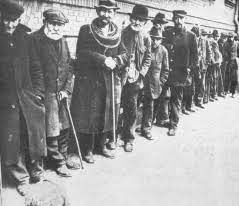Class 9 History Chapter 3 Notes - Nazism and the Rise of Hitler
Introduction
- In spring 1945, eleven-year-old Helmuth overheard his parents discussing the terrifying possibility of killing the family or his father committing suicide alone. His father, a well-known physician, feared retaliation from the Allies, believing they would respond as the Germans had against the Jews and disabled individuals.
- His father expressed his fear of revenge, stating, "Now the Allies will do to us what we did to the crippled and Jews." The next day, Helmuth and his father shared their last happy moments in the woods before his father took his own life.
- Helmuth was profoundly affected by these events and refused to eat at home for nine years, fearing that his mother might poison him.
- Though Helmuth may not have fully grasped the implications, his father was a Nazi and a supporter of Adolf Hitler.
- Many are aware of the Nazis and Hitler. You might know about Hitler's aim to transform Germany into a powerful nation and his desire to conquer all of Europe. You may also have heard about the mass killings of Jews.
- However, Nazism was more than just a few isolated incidents; it was a systematic ideology regarding the world and politics.
- In May 1945, Germany surrendered to the Allies after Hitler, Goebbels, and their families committed suicide in April 1945.

Genocidal War
- Nazi Germany's actions led to the mass murder of millions, including around 6 million Jews, 200,000 Gypsies, 1 million Polish civilians, and 70,000 Germans who were viewed as mentally or physically disabled, along with countless political opponents.
- The Nazis created a new method of killing, especially through gassing at extermination camps like Auschwitz.
Nuremberg Tribunal
- The Nuremberg Tribunal was set up to try Nazi war criminals for Crimes against Peace, War Crimes, and Crimes Against Humanity.
- It sentenced only eleven top Nazis to death, while many others received life imprisonment.
- Although some justice was served, the punishments were much less than the scale of their crimes.
- The Allies aimed to be less harsh on the defeated Germany compared to the aftermath of the First World War.
Rise of Nazism
- The rise of Nazi Germany can be partly traced back to Germany's experiences following World War I.
- This time of instability and resentment helped Nazism gain support among the German people.
Birth of The Weimar Republic
- Germany, a strong empire in the early 20th century, fought in the First World War (1914-1918) alongside the Austrian Empire against the Allies (England, France, and Russia). All sides entered the war eagerly, hoping for a quick victory. However, the war dragged on, exhausting Europe’s resources.
- Germany initially made progress by invading France and Belgium. But with the Allies bolstered by the US joining in 1917, they ultimately defeated Germany and the Central Powers in November 1918.
- The fall of Imperial Germany and the emperor’s abdication allowed parliamentary parties to reshape German politics. A National Assembly convened in Weimar and crafted a democratic constitution with a federal system. Now, deputies were elected to the German Parliament, or Reichstag, based on equal and universal votes from all adults, including women.
- Deputies were elected to the German Parliament, or Reichstag, through equal and universal votes, including women. However, this republic faced significant opposition from its citizens mainly due to the harsh terms imposed after Germany's defeat in the war.
The Treaty of Versailles enforced severe and humiliating conditions on Germany, which included:
1. Loss of overseas colonies
2. 10% of its population
3. 13% of its territory
4. 75% of its iron resources
5. 26% of its coal resources The republic bore the burden of war guilt and national shame, being financially crippled by a compensation payment of £6 billion. Additionally, Allied forces occupied the resource-rich Rhineland for most of the 1920s.
Supporters of the Weimar Republic, primarily Socialists, Catholics, and Democrats, were often targeted in conservative nationalist circles and were derisively called the 'November criminals'.
Challenges of the Weimar Republic
- The Weimar Republic struggled to achieve a parliamentary majority due to the proportional representation system, making it difficult for any one party to gain control, resulting in coalition governments.
- Another flaw was Article 48, which allowed the President to impose emergency measures, suspend civil rights, and rule by decree.
- Throughout its brief existence, the Weimar Republic experienced twenty different cabinets, averaging 239 days in office, and frequently used Article 48.
- Despite these measures, the crises remained unmanageable, leading to a loss of faith in the democratic parliamentary system, which seemed unable to provide solutions.
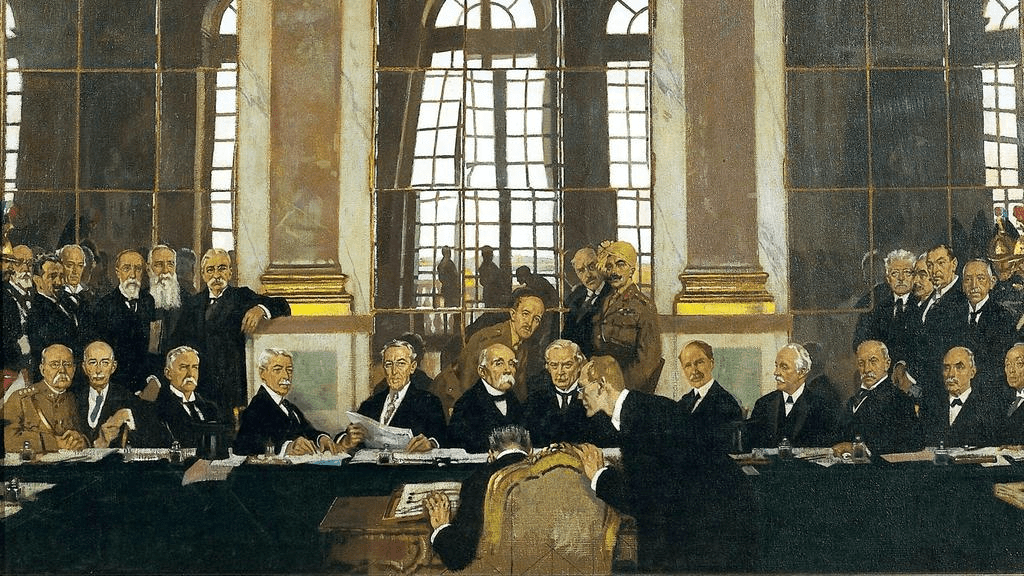 Treaty of Versailles Coming into Effect
Treaty of Versailles Coming into Effect
Public Reaction
- The Weimar Republic was blamed for Germany's defeat in the war and the humiliation of the Treaty of Versailles.
- Many Germans viewed the new government as weak and responsible for national disgrace.
The Effects of the War
- The war had a devastating impact on Europe, affecting the continent both psychologically and financially.
- Europe changed from a continent of creditors to one of debtors.
- The young Weimar Republic was made to pay for the mistakes of the old empire.
- The republic bore the weight of war guilt and national humiliation, and was financially crippled by compensation payments.
- Germany lost its overseas colonies, a tenth of its population, 13 percent of its territories, 75 percent of its iron, and 26 percent of its coal to France, Poland, Denmark, and Lithuania.
- The Allied Powers demilitarised Germany to weaken its power.
- Supporters of the Weimar Republic, such as Socialists, Catholics, and Democrats, became easy targets for attacks in conservative nationalist circles.
- They were mockingly called the ‘November criminals’. This hostile attitude influenced political developments in the early 1930s.
- The First World War left a deep mark on European society and politics.
- Soldiers were placed above civilians, with emphasis on men being aggressive, strong, and masculine.
- The media glorified trench life, but the reality was that soldiers lived miserable lives in these trenches.
- They faced rats, poisonous gas, and enemy shelling, witnessing their ranks diminish rapidly.
- Aggressive war propaganda and national honour became central in public life.
- Support grew for conservative dictatorships that emerged after the war, while democracy struggled amid the instabilities of interwar Europe.
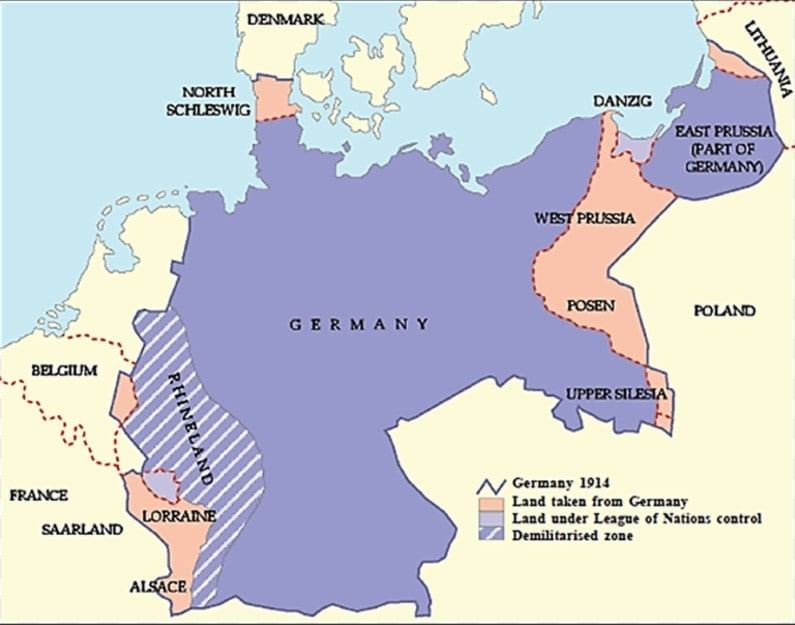 Parts of Territory that Germany lost after the Treaty of Versailles
Parts of Territory that Germany lost after the Treaty of Versailles
Political Radicalism and Economic Crisis
- The Weimar Republic was created in response to the revolutionary uprising by the Spartacist League, which took inspiration from the Bolshevik Revolution in Russia.
- In many cities, Soviets of workers and sailors were set up, and there were calls for Soviet-style governance in Berlin.
- Those opposed to this movement, including Socialists, Democrats, and Catholics, gathered in Weimar to form the democratic republic.
- The Weimar Republic suppressed the uprising with aid from the Free Corps, a group of war veterans.
- In their despair, the Spartacists later established the Communist Party of Germany. This led to a bitter divide, making it impossible for Communists and Socialists to unite against Hitler.
- Political radicalisation increased due to the economic crisis of 1923. Germany had financed much of the war through loans and was required to pay war reparations in gold, which drained its gold reserves.
- When Germany refused to pay in 1923, the French occupied the Ruhr industrial area to seize coal.
- In response, Germany resorted to passive resistance and started printing money without restraint, resulting in hyperinflation.
- The value of the German mark plummeted dramatically:
- April 1923: 1 US dollar = 24,000 marks
- July 1923: 1 US dollar = 353,000 marks
- August 1923: 1 US dollar = 4,621,000 marks
- December 1923: 1 US dollar = 98,860,000 marks
- This situation gained widespread attention, drawing international sympathy. This period became known as hyperinflation, a time of extreme price increases.
- Ultimately, the Americans intervened and assisted Germany by implementing the Dawes Plan, which revised the reparation terms to alleviate the financial strain on the German people.
The Years of Depression
- The period from 1924 to 1928 brought some stability, but it was built on fragile foundations.
- Germany's investments and industrial recovery relied heavily on short-term loans from the USA. This support vanished after the Wall Street Crash in 1929.
- On 24 October 1929, 13 million shares were sold in a panic, signalling the beginning of the Great Economic Depression.
- Over the next three years, from 1929 to 1932, the national income of the USA halved. Factories closed, exports fell, farmers suffered greatly, and investors pulled their money from the market.
- The repercussions of the US recession were felt globally, with Germany being the most severely affected. By 1932, industrial production in Germany had plummeted to 40% of the 1929 level.
- The unemployment rate soared to an unprecedented 6 million.
- On the streets, men held signs reading, 'Willing to do any work,' while unemployed youths often played cards, loitered in corners, or queued at job centres.
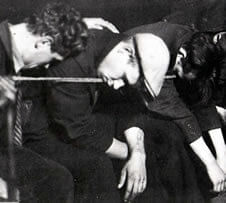 Sleeping on the line. During the great depression, the unemployed could not hope for either wage or shelter
Sleeping on the line. During the great depression, the unemployed could not hope for either wage or shelter
- As employment opportunities dwindled, some youths turned to crime, and despair became widespread.
- The middle class, particularly salaried workers and pensioners, saw their savings erode as the currency lost its value.
- Small business owners, self-employed individuals, and retailers suffered significant losses as their businesses collapsed.
- They feared proletarianisation, the worry of being reduced to working-class status or, worse, becoming unemployed.
- Organised workers managed to stay afloat, but rising unemployment weakened their negotiating power. Big businesses faced crises, and farmers experienced a sharp drop in agricultural prices.
- Women struggled to feed their children and were filled with despair. Politically, the Weimar Republic was unstable, with flaws in the constitution making it susceptible to dictatorship.
- The system of proportional representation made it nearly impossible for any single party to achieve a majority, resulting in rule by coalitions.
- Article 48 granted the President the power to impose emergency measures, suspend civil rights, and govern by decree.
- Throughout its brief existence, the Weimar Republic saw twenty different cabinets, averaging just 239 days in office, often relying on Article 48.
- Despite these actions, the crisis remained unmanageable, leading to a loss of faith in the democratic parliamentary system, which appeared incapable of providing solutions.
 Homeless Man Queuing Up for Night Shelter
Homeless Man Queuing Up for Night Shelter
Hitler’s Rise to Power
- After World War I, Germany was in a state of chaos.
- The Treaty of Versailles imposed severe penalties, leading to widespread anger.
- The country faced economic instability marked by hyperinflation and high unemployment, alongside political unrest and frequent changes in government.
- The Weimar Republic dealt with significant challenges, including cabinets lasting an average of just 239 days and a frequent use of Article 48, which allowed the President to rule by decree during emergencies, undermining democracy. This crisis in the economy, politics, and society set the stage for Hitler's rise to power.
- Amid this turmoil, Adolf Hitler, born in 1889 in Austria, emerged as a significant figure.
- He joined the German Workers' Party in 1919 and later transformed it into the Nazi Party.
- Initially, the Nazis struggled to gain popular support until the early 1930s.
- The Great Depression in 1929 changed the landscape, causing widespread suffering and making people desperate for change.
- During this time, Nazism evolved into a mass movement. Hitler promised jobs for the unemployed and a secure future for the youth, creating a receptive audience for his messages of hope and national renewal.
- By 1932, the Nazi Party had become the largest party in the Reichstag, aided by Hitler's powerful speeches and the party's effective propaganda.
- He vowed to build a strong nation, overturn the injustices of the Versailles Treaty, and restore the dignity of the German people.
- In this environment, Nazi propaganda cleverly portrayed Hitler as a messiah, a saviour who had come to rescue people from their troubles.
- This image resonated with a public that had lost dignity and was suffering from economic and political crises.
- On January 30, 1933, President Hindenburg appointed Hitler as Chancellor, marking a pivotal moment in his rise to power.
- The combination of post-war dissatisfaction, economic struggles, and the political instability of the Weimar Republic enabled Hitler to solidify his position and ultimately dismantle democracy in Germany.
Key Events in Hitler's Rise
- Early Life and World War I experience: Born in 1889 in Austria, Hitler faced poverty early on. He joined the German Army in World War I, serving as a messenger on the front lines, rising to the rank of corporal, and receiving medals for bravery.
- Post-War Disillusionment: The defeat of Germany and the Treaty of Versailles deeply impacted Hitler, leaving him outraged by the treaty's terms.
- Formation of the Nazi Party: In 1919, Hitler joined the German Workers’ Party, which he later transformed into the Nazi Party.
- Failed Coup and Imprisonment: In 1923, Hitler attempted to gain control of Bavaria and march to Berlin but failed. He was arrested, tried for treason, and imprisoned.
- Great Depression and Rise to Power: The economic crisis resulted in widespread hardship, making the population desperate for change.
- Nazi Propaganda and Electoral Success: Hitler was a charismatic speaker, and Nazi propaganda effectively promised a better future, including jobs and national strength. In 1928, the Nazi Party received only 2.6% of the vote, but by 1932, it became the largest party with 37% of the votes in the Reichstag.
- Political Strategy and Mass Mobilization: Hitler introduced a new style of politics that emphasised rituals and spectacle to unite and mobilise the masses. The Nazis held large rallies and public meetings, using symbols like the Swastika and the Nazi salute to create a sense of unity. Applause after speeches reinforced the spectacle of strength.
The Destruction of Democracy
- On 30 January 1933, President Hindenburg appointed Hitler as Chancellor, the top role in the cabinet.
- The Nazis had successfully gained support from conservatives.
- After taking power, Hitler began to dismantle democratic structures.
- A mysterious fire in the German Parliament in February helped his cause.
- The Fire Decree of 28 February 1933 suspended civil rights, such as freedom of speech, press, and assembly, which were protected by the Weimar constitution.
- The Weimar Republic experienced instability with twenty different cabinets, averaging just 239 days in office.
- Article 48 was misused, allowing the President to impose emergency powers.
- Hitler targeted his main opponents, the Communists, many of whom were sent to newly formed concentration camps.
- The repression of Communists was intense, with 1,440 of 6,808 arrest files in Duesseldorf alone being for Communists.
- On 3 March 1933, the Enabling Act was passed, establishing a dictatorship in Germany.
- This act allowed Hitler to bypass Parliament and rule by decree.
- All political parties and trade unions were banned except for the Nazi Party.
- The government took control of the economy, media, military, and judiciary.
- New security forces were formed, including:
- Regular police (in green uniform)
- SA (Storm Troopers)
- Gestapo (secret state police)
- SS (protection squads)
- Criminal police
- Security Service (SD)
- These forces contributed to the Nazi state's reputation as a feared regime.
- People could be detained, tortured, or arrested without legal procedures.
- The police operated without accountability.
Reconstruction
- Hitler appointed economist Hjalmar Schacht to lead economic recovery.
- This resulted in full production and employment through a state-funded work programme, which included:
- Construction of the German superhighways
- Creation of the Volkswagen
- In foreign policy, Hitler quickly achieved significant milestones:
- Withdrew from the League of Nations in 1933
- Reoccupied the Rhineland in 1936
- Unified Austria and Germany in 1938 under the slogan "One people, One empire, One leader"
- Annexed the German-speaking Sudetenland from Czechoslovakia and later the entire country
- Hitler received tacit support from England, which felt the Versailles treaty was too severe.
- Despite Schacht’s warnings against large-scale rearmament, Hitler opted for war to address the economic crisis.
- Puppet regimes loyal to Nazi Germany were set up throughout Europe.
- By the end of 1940, Hitler had reached the peak of his power.

The Nazi Worldview
Understanding the link between Nazi crimes and their belief system is essential. Hitler's worldview, which shaped Nazi ideology, was based on a strict racial hierarchy. At the top were the blond, blue-eyed Nordic Aryans, who were deemed the superior race. At the bottom of this hierarchy were the Jews, viewed as an anti-race and the main enemies of the Aryans. Other racial groups were ranked in between, based on their physical traits and perceived racial characteristics.
Influence of Darwin and Spencer on Hitler's Racism
- Hitler's racism was shaped by the ideas of Charles Darwin and Herbert Spencer.
- Darwin introduced concepts of evolution and natural selection, explaining the development of living things.
- Spencer contributed the idea of survival of the fittest, suggesting that only adaptable species would thrive.
- Although Darwin did not endorse human intervention in natural selection, his ideas were misused by racist thinkers to justify imperial rule over conquered peoples.
- The Nazis adopted the belief that the strongest race would survive and that weaker races would perish.
- They believed the Aryan race was the strongest and needed to maintain its purity to dominate the world.

Hitler's Concept of Lebensraum
- A significant aspect of Hitler's ideology was the idea of Lebensraum, meaning living space.
- He believed that new territories needed to be acquired for settlement.
- Hitler aimed to expand German borders by moving eastward, viewing Poland as a testing ground for this idea.
- Poland became the laboratory for this experimentation.
- Hitler stated, "The primary right of this world is the right to life, so far as one possesses the strength for this."
Establishment of the Racial State
Once in power, the Nazis quickly began to implement their vision of creating an exclusive racial community of pure Germans by physically eliminating all those considered 'undesirable.' This included even Germans perceived as impure or abnormal, who had no right to exist under Nazi policies. The establishment of a racial state was central to Nazi ideology, as they aimed to create a society composed solely of 'pure and healthy Nordic Aryans.'
Nazi Persecution and Racial Ideology
- Once in power, the Nazis quickly started to create their vision of a racial community of pure Germans by eliminating those they deemed 'undesirable'. They aimed for a community of 'pure' Nordic Aryans, excluding anyone considered impure or abnormal. This also included Germans who were seen as unfit or abnormal, who were denied the right to exist. Under the Euthanasia Programme, mentally and physically unfit Germans were sentenced to death.
Nazi Worldview:
- Source A: Hitler believed in conquering and dominating territories based on strength and industry, viewing life as a privilege for the strong.
- Source B: Hitler was critical of Germany's limited size, arguing for expansion to compete with other global powers.
Targeted Groups:
- Jews: Faced extreme persecution based on false racial theories, with the aim of total elimination.
- Others: Gypsies, blacks, Russians, and Poles were also seen as racial inferiors, enduring severe persecution and forced labour. Historical context includes traditional Christian hostility and medieval discrimination against Jews, which set the stage for Nazi hatred.
Timeline of Persecution:
- 1933-1938: Nazis terrorised, impoverished, and segregated Jews, forcing many to flee Germany.
- 1939-1945: Efforts shifted towards concentration camps and extermination in gas chambers, mainly in Poland.
The Racial Utopia:
- During the war, the Nazis pursued their deadly racial goals. Occupied Poland was divided into different regions. Much of northwestern Poland was annexed to Germany, forcing Poles to abandon their homes for ethnic Germans brought in from other parts of Europe.
- The remaining area was named the General Government, where Poles and other 'undesirables' were treated like cattle. Polish children who looked like Aryans were taken from their mothers and examined by 'race experts'. If they passed the racial tests, they were raised in German families. If they failed, they were sent to orphanages, where most died.
- The General Government included large ghettos and gas chambers, which became primary sites for the extermination of Jews.
- Additionally, the Nuremberg Laws were established in September 1935, defining who could be considered a German citizen: only those of German or related blood would have German citizenship and enjoy the protection of the German empire.
 |
Download the notes
Detailed Chapter Notes: Nazism and the Rise of Hitler
|
Download as PDF |
Youth in Nazi Germany
Hitler aimed to create a powerful Nazi society by teaching children Nazi beliefs both in school and beyond.
- Changes in Schools:
- Schools were 'cleansed' of Jews and teachers who were seen as politically unreliable.
- Children were separated by race; Jews and other 'undesirable' children (such as those who were physically disabled or Gypsies) were expelled.
- Eventually, in the 1940s, these groups were taken to gas chambers.
- Nazi Schooling:
- Textbooks were rewritten to support Nazi racial ideas.
- Racial science was introduced, promoting negative stereotypes about Jews, even in maths lessons.
- Children were taught to be loyal and obedient, to hate Jews, and to idolise Hitler. Sports were used to instil a sense of violence and aggression; Hitler believed boxing could make children strong and masculine.
- Youth Organizations:
- Jungvolk: Boys could join at the age of 10.
- Hitler Youth: Mandatory for boys aged 14; the focus was on glorifying war, aggression, and Nazism while rejecting democracy and those seen as 'undesirable.'
- After training, youths were sent to the Labour Service, military, or Nazi organisations.
- Formation and Control:
- The Nazi Youth League was established in 1922 and was renamed Hitler Youth four years later.
- All other youth organisations were systematically dissolved and banned to ensure control was consolidated.
The Nazi Cult of Motherhood
In Nazi Germany, children were taught that men and women were inherently different. The global fight for gender equality was depicted as harmful to society. Boys were encouraged to be aggressive, strong, and tough, while girls were instructed to become good mothers who would raise pure-blooded Aryan children. Girls were expected to maintain racial purity, stay away from Jews, manage the household, and instil Nazi values in their children. They were seen as the bearers of Aryan culture and race.
In 1933, Hitler stated: 'In my state, the mother is the most important citizen.'
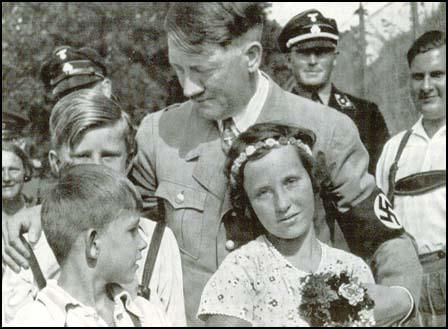 Desirable Children that Hitler wanted to see multiplied
Desirable Children that Hitler wanted to see multiplied
The Nazi Cult of Motherhood
- In Nazi Germany, children were taught that women were fundamentally different from men.
- The movement for equality between men and women was seen as a threat to society.
- Boys were trained to be strong, masculine, and unemotional.
- Girls were taught to be dedicated mothers responsible for raising pure-blooded Aryan children.
- Women were expected to maintain racial purity, avoid contact with Jews, and pass on Nazi values to their children.
- Hitler stated in 1933, "In my state the mother is the most important citizen."
- However, not all mothers received equal treatment in Nazi Germany.
- Women who had racially undesirable children faced penalties, while those with racially desirable children were rewarded.
- Rewards included:
- Preferential treatment in hospitals.
- Concessions in shops.
- Discounts on theatre tickets and railway fares.
- To encourage higher birth rates, the Honour Crosseswere introduced:
- A bronze cross for four children.
- A silver cross for six children.
- A gold cross for eight or more children.
- Aryan women who did not follow Nazi rules faced public shame and harsh punishments.
- Those who associated with Jews, Poles, or Russians were publicly humiliated:
- Paraded through towns with shaved heads and blackened faces.
- Held placards saying, "I have sullied the honour of the nation."
- Many faced jail time and lost their social standing, including their families, for this 'criminal offence.'
The Art of Propaganda
- Nazis used euphemisms for mass killings, calling them special treatment, final solution (for Jews), euthanasia (for the disabled), selection, and disinfection.
- 'Evacuation' referred to deportations to gas chambers.
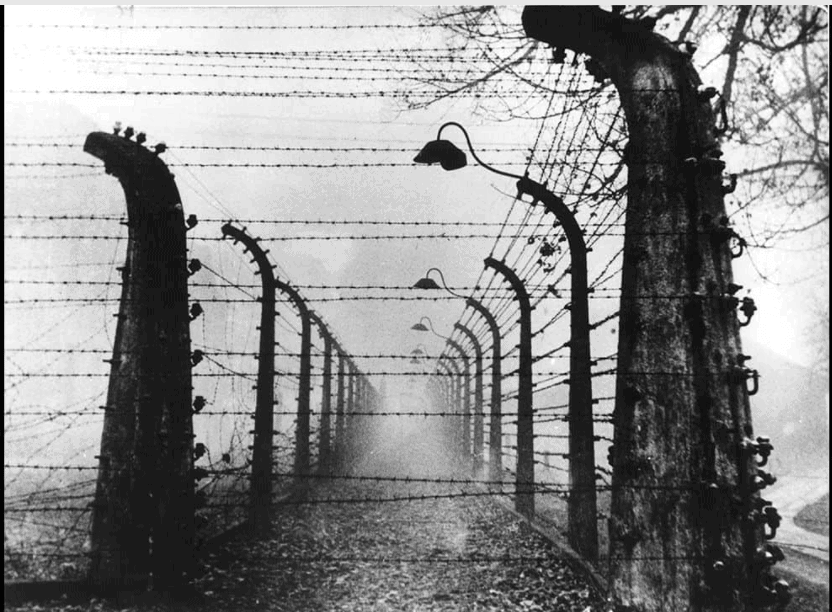 A Concentration Camp
A Concentration Camp
- Gas chambers were disguised as 'disinfection areas' and made to look like bathrooms with fake showerheads.
- Nazi ideas spread through various media:
- Visual images.
- Films.
- Radio broadcasts.
- Posters.
- Catchy slogans and leaflets.
- Propaganda films, like The Eternal Jew, aimed to create hatred towards Jews.
- Orthodox Jews were often portrayed as vermin, rats, and pests in these materials.
- The Nazis targeted specific groups in their propaganda, claiming they alone could fix the issues facing Germany.
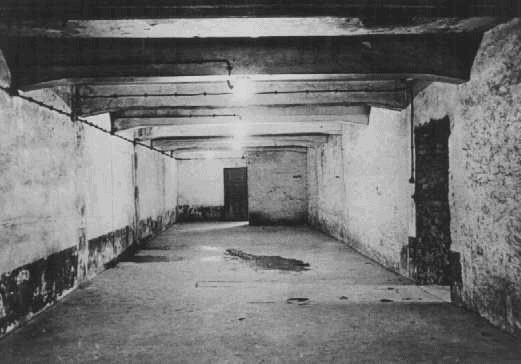 Gas Chamber
Gas Chamber
Ordinary People and the Crimes Against Humanity
People's responses to Nazism in Germany varied widely:
- Many Germans accepted Nazi beliefs, adopting its language and ideas. They expressed hatred towards Jews, marked their homes, and reported neighbours they considered suspicious, genuinely believing that Nazism would lead to prosperity.
- Some organised active resistance against Nazism, risking police repression and death.
- However, most Germans remained passive observers, choosing to ignore the situation. They were often too afraid to act, protest, or stand out. Pastor Niemoeller, a resistance fighter, noted this silence in the face of Nazi crimes, regretting that people did not speak out until it was too late.
- The lack of resistance was not only due to fear. As Erna Kranz, a German who lived through the 1930s, pointed out, many people welcomed the apparent economic recovery under the Nazis, feeling downtrodden.
- In Nazi Germany, Jews suffered many forms of death even before reaching the gas chambers. The psychological torment began long before many were sent to their deaths, causing them to endure repeated suffering.

Knowledge about the Holocaust
- After the war ended and Germany was defeated, many Germans were focused on their own struggles. Meanwhile, the Jewish community wanted the world to remember the horrors and suffering they experienced during the Nazi killing operations, known as the Holocaust.
- The death toll included 6 million Jews, 200,000 Gypsies, 1 million Polish civilians, and 70,000 Germans labelled as mentally and physically disabled, along with countless political opponents.
- Following their defeat, Nazi leaders ordered the destruction of incriminating evidence in their offices by distributing petrol to their functionaries.
- During the Nuremberg Tribunal, only eleven top Nazis were sentenced to death, while many others received life sentences.
Difficult Words
- Weimar Republic: The democratic government founded in Germany following the abdication of Emperor Wilhelm II in 1918, which lasted until 1933 when the Nazis came to power.
- Treaty of Versailles: The peace treaty that ended World War I between Germany and the Allied Powers, which imposed heavy reparations and territorial losses on Germany.
- War Guilt Clause: Article 231 of the Treaty of Versailles, which assigned blame for World War I solely to Germany and its allies, making them responsible for all damages.
- Hyperinflation: A very high and typically accelerating rate of inflation, often exceeding 50% per month, leading to the rapid erosion of the real value of local currency, as the prices of all goods increase.
- Proportional Representation: An electoral system in which parties gain seats in proportion to the number of votes cast for them.
- Article 48: A clause in the Weimar Constitution that allowed the President, under certain circumstances, to take emergency measures without the prior consent of the Reichstag.
- Chancellorship: The position of the Chancellor, a senior official (often the prime minister) in some countries, responsible for leading the executive branch and the government.
- Enabling Act: A 1933 Weimar Constitution amendment that gave the German Cabinet — in effect, Chancellor Adolf Hitler — the power to enact laws without the involvement of the Reichstag.
- Euthanasia Programme: A program during Nazi Germany aiming at the systematic killing of the mentally and physically disabled and sick, considered by the Nazis as "life unworthy of life."
- Lebensraum: A Nazi policy and ideology of territorial expansion, based on the notion of natural rights to land believed necessary for national survival and growth.
- Racial Hygiene: The set of eugenic policies embraced by the Nazis to "improve" the genetic quality of a race, primarily aimed at increasing the reproduction of characteristics deemed desirable.
- Genocide: The intentional action to destroy a people—usually defined as an ethnic, national, racial, or religious group—in whole or in part.
- Orthodox Jews: Adherents to a traditional form of Judaism which strictly observes religious laws and practices.
- Propaganda: Information, especially of a biased or misleading nature, used to promote a political cause or point of view.
- Holocaust: The genocide of six million Jews and the persecution and murder of other minority and dissenting groups by the Nazis during World War II.
- Concentration camp: A camp where people were isolated and detained without due process of law. Typically, it was surrounded by electrified barbed wire fences.
- Proletarianisation: To become impoverished to the level of working classes.
- Nordic German Aryans: One branch of those classified as Aryans. They lived in north European countries and had German or related origin
- Gypsy: The groups that were classified as ‘gypsy’ had their own community identity. Sinti and Roma were two such communities. Many of them traced their origin to India.
- Pauperised: Reduce to absolute poverty
- Persecution: Systematic, organised punishment of those belonging to a group or religion
- Usurers: Moneylenders charging excessive interest; often used as a term of abuse
- Jungvolk: Nazi youth groups for children below 14 years of age.
Some important dates
- August 1, 1914: First World War begins.
- November 9, 1918: Germany capitulates, ending the war.
- November 9, 1918: Proclamation of the Weimar Republic.
- June 28, 1919: Treaty of Versailles.
- January 30, 1933: Hitler becomes Chancellor of Germany.
- September 1, 1939: Germany invades Poland. Beginning of the Second World War.
- June 22, 1941: Germany invades the USSR.
- June 23, 1941: Mass murder of the Jews begins.
- December 8, 1941: The United States joins Second World War.
- January 27, 1945: Soviet troops liberate Auschwitz.
- May 8, 1945: Allied victory in Europe.
|
56 videos|437 docs|80 tests
|
FAQs on Class 9 History Chapter 3 Notes - Nazism and the Rise of Hitler
| 1. What were the main effects of World War I on Germany that contributed to the rise of Nazism? |  |
| 2. How did Adolf Hitler rise to power in Germany? |  |
| 3. What role did propaganda play in the Nazi regime? |  |
| 4. What were the social impacts of Nazism on German society? |  |
| 5. How did the Nazi regime's policies lead to World War II? |  |

